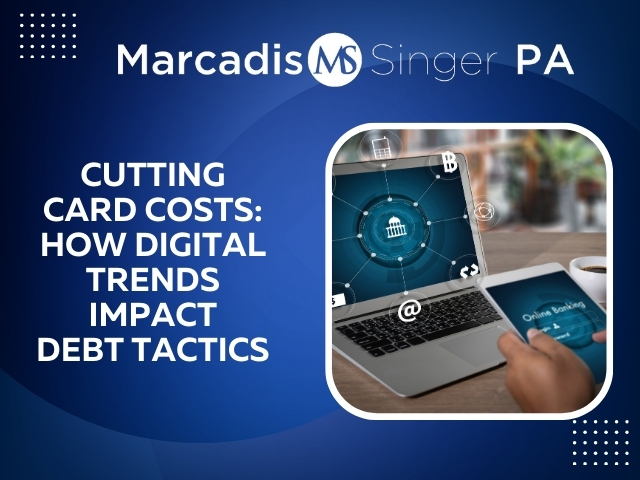In today’s rapidly changing financial world, it’s more important than ever to grasp how rising credit card charges and the growth of digital banking affect us all. This is especially true for debt collection attorneys who need to keep up with these trends to excel in their field.
Credit Card Costs in the Modern Economy
Recent years have seen a noticeable rise in credit card fees and interest rates. This escalation not only affects consumer spending habits but also has profound implications for accumulating consumer debt.
The following is a DRAMATIZATION AND IS NOT AN ACTUAL EVENT: Consider the case of John Doe, who, due to escalating credit card interest rates, found himself in a debt spiral, struggling to keep up with the increasing monthly payments.
Effect on Consumer Spending and Debt
Higher credit card costs inevitably lead to more significant debt burdens for consumers. This trend is particularly concerning for those already struggling to manage their financial obligations.
Impact of Digital Banking on Consumer Debt
With the advent of digital banking, consumer interactions with financial institutions have transformed. This shift is not only changing how consumers manage their finances but also how they accumulate and perceive debt.
The impact of digital banking on consumer debt is multifaceted and significant. The ease and convenience of managing finances online have altered consumer behaviors and attitudes toward borrowing and debt. Here’s an expanded view on this topic:
- Ease of Access to Credit: Digital banking platforms have made accessing credit easier than ever. With online loan applications and instant credit decisions, consumers can obtain loans or credit cards quickly. This immediacy can lead to an increase in impulse borrowing, as consumers may be less likely to fully consider the long-term implications of their debt.
- Increased Credit Visibility: Digital banking allows consumers to easily view and manage their credit. Many banking apps provide credit score monitoring and detailed credit reports, making consumers more aware of their financial health. This increased visibility can encourage better credit management but may also lead consumers to feel more comfortable taking on additional debt.
- Automated Lending Decisions: Algorithms and automated processes are now commonly used in lending decisions. While this can make the lending process more efficient, it also raises concerns about the removal of personal judgment and the potential for consumers to be encouraged to take on more debt than they can handle.
- Behavioral Nudges: Digital banking platforms often use behavioral nudges to encourage certain actions. For example, a consumer might be nudged to use a line of credit for a purchase. While these nudges can be helpful, they can also lead to increased consumer debt if not used responsibly.
- Mobile Payments and E-Wallets: The rise of mobile payments and e-wallets has made spending easier and more seamless, which can lead to a disconnect between spending and the impact on one’s financial situation. This ‘out of sight, out of mind’ phenomenon can result in consumers accumulating more debt without fully realizing it.
- Debt Management Tools: Many digital banking platforms offer tools for debt management and budgeting. These tools can help consumers track their spending, set budget goals, and stay on top of their debt repayments, potentially reducing the likelihood of falling into problematic debt.
- Consumer Education: Digital banking platforms have the potential to provide educational resources about debt and financial management. This access to information can empower consumers to make more informed decisions about debt.
- Changing Attitudes Toward Debt: The convenience of digital banking might be changing consumer attitudes toward debt. Easy access to credit lines and loans, combined with targeted marketing, can normalize high levels of consumer debt.
In conclusion, while digital banking has brought significant benefits in terms of convenience and access to financial services, it also presents challenges related to consumer debt. The ease of accessing credit, combined with sophisticated marketing and behavioral nudges, can lead to increased consumer borrowing. However, the same technology offers tools for better debt management and financial education, suggesting that the impact of digital banking on consumer debt is complex and multi-layered.
Role of Mobile Banking Apps
Mobile banking apps have made credit management more accessible yet more complex. Easy access to credit through these apps can lead to uninformed spending decisions, further exacerbating debt issues.
Online Financial Tools and Credit Usage
Online tools offer consumers a clearer view of their financial health. However, the ease of tracking and managing finances digitally can sometimes lead to overconfidence in credit management.
Strategies for Debt Collection Attorneys
For debt collection attorneys, adapting to these evolving trends is critical. Understanding the nuances of digital banking and the psychological impact of credit card debt on consumers can significantly enhance debt recovery strategies.
Staying Informed on Digital Innovations and Regulations
Keeping abreast of digital banking innovations and regulatory changes in credit card policies is essential for effective debt collection practices in today’s digital age.
FAQs
1. How have digital banking trends impacted consumer debt?
Digital banking trends have made credit more accessible but also more challenging to manage, often leading to an increase in consumer debt.
2. What should debt collection attorneys focus on in this digital era?
Attorneys should focus on understanding digital banking trends, consumer behavior regarding credit usage, and staying updated with the latest credit card regulations.
Conclusion and Call to Action
The landscape of credit card costs and digital banking is continually evolving, presenting both challenges and opportunities for debt collection attorneys. By staying informed and adapting to these changes, attorneys can effectively guide their clients through the complexities of modern financial management.
Are you facing challenges with debt collection in this rapidly changing digital era? Contact us for expert legal guidance and support tailored to the modern financial landscape.
